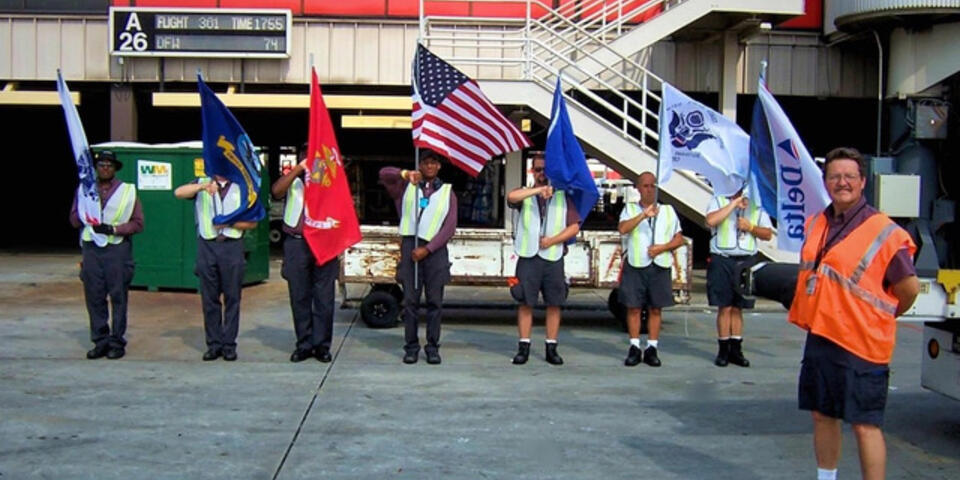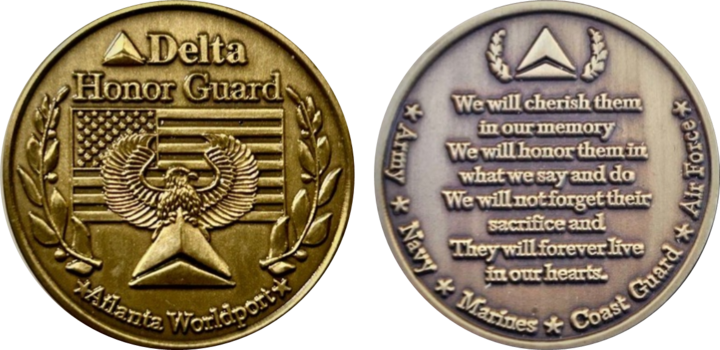Source: Delta Air Lines

-
As the Delta Honor Guard marks its 20th anniversary, one of its founders reflects on the group’s earliest days and shares poignant memories of paying tribute to fallen heroes.
Tom joined the Marine in her salute and learned, through her tears, that the casket held her brother, killed while protecting his fellow Marines during an ambush. Deeply moved, Tom called me to help create a plan to ensure such a moment would never again happen on the Delta ramp. Together, we formed the Delta Honor Guard.
Tom connected with veterans and staff across the airport and purchased flags and vests. I drafted our mission and procedures and was asked to serve as the Honor Guard Chaplain. We even designed Challenge Coins to present to each escort and family of the deceased after the funerals.
With the Delta Board of Directors’ approval and full support from the Atlanta Worldport Vice President, the first Honor Guard service took place on July 20, 2005, when General William Westmoreland’s remains arrived at gate A-26. Word of our efforts spread quickly in the military community. More and more fallen heroes were routed through Atlanta, and our responsibilities grew.
Though we worked night shifts, we spent all our free time recruiting volunteers for both day and night ceremonies. Even so, there were times when we couldn’t cover every arrival with a complete Honor Guard due to sheer volume. Over the first year and a half, we conducted hundreds of services. It was an honor — but also an emotionally draining experience.
One particularly heart-wrenching day, Tom and I arrived at the gate to find the escort already standing by. After our prayer, the remains were brought out. Instead of a full-size coffin, we were handed a small, eight-inch wooden cube — light as air. I looked at the escort, who said in a hollow voice, “It’s all of him they could find.” We were speechless.
Yet not every moment was sorrowful. Some were uplifting and unforgettable. On one flight, with the captain’s permission, an Army Sergeant escort spoke to our customers, ending his short message with, “Today, all of you are escorts — escorts of the heart.” Everyone on board refused to leave their seats until the service was complete. We looked up and saw faces — men, women, and children — pressed to the windows, watching in silent respect. Families gathered at the concourse gates, holding up their children to witness the ceremony. Even the flight crew joined us in honoring the fallen.
Afterward, the Sergeant personally thanked each guard member. He later wrote an article in Stars and Stripes, describing the experience with Delta’s Honor Guard, “led by a retired Army Chaplain,” as one of profound meaning.
Today, I salute the Delta people who continue the work of the Honor Guard. In honoring the fallen with compassion and dignity, we will answer the Sergeant’s heartfelt challenge into our next century, for, “No One Better Connects the World’s Hearts than Delta.”
Over the past 20 years, Delta’s Honor Guard in Atlanta has cared for the remains of more than 10,500 fallen heroes and first responders. The group has grown to serve in other Delta airports, including Detroit, Minneapolis, Salt Lake City, Washington, D.C. and more.
The Honor Guard is just one part of Delta’s commitment to the armed forces, a pillar of its company culture. Delta employs nearly 12,000 veterans and is proud to support the brave men and women who serve and have sacrificed for their country.

